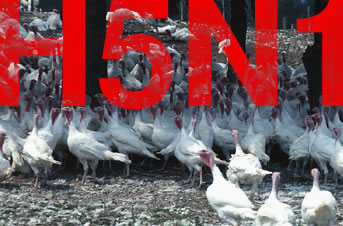Feb 12 2007
 The Hungarian Agriculture Ministry has admitted that turkey meat from a plant near the site of a Hungarian bird flu outbreak was sold to various parts of Europe including Britain.
The Hungarian Agriculture Ministry has admitted that turkey meat from a plant near the site of a Hungarian bird flu outbreak was sold to various parts of Europe including Britain.
However they continue to deny the meat is responsible for transmitting the virus to the poultry in Suffolk.
Nevertheless British government officials continue to investigate a link between an outbreak at a farm owned by Bernard Matthews in Suffolk, eastern England, where 160,000 turkeys were culled and an earlier one in geese in the eastern European country.
Although Bernard Matthews initially hotly denied any possibility of a link between the Hungarian operations in Sarvar and it's farm in Suffolk, the company later admitted that turkey had been shipped between the two processing plants.
Media reports have suggested a turkey plant in the eastern Hungarian town of Kecskemet as a possible culprit, transmitting the virus through the Bernard Matthews' operation in the Hungarian town of Sarvar, western Hungary.
Hungarian Agriculture Ministry officials however insist that every possible item was checked and no problems were reported in any other export destinations.
They have collected all the relevant documents back to November 2006, including those connected to processing, animal health and the sales of every firm affected and say the fate of every item can be precisely traced.
They say the documents support the fact that the British outbreak cannot have originated from Hungary.
Hungary intends to promptly submit a report to the European Commission in order to prove there can be no link between the cases in Britain and Hungary.
The British government had initially said the British infection was most likely to have come from a wild bird but late last week the finger was pointed at Hungary following tests which showed the virus to be identical to the Hungarian one and that it could have been spread by infected meat.
Hungarian experts say connecting the two outbreaks because the virus is identical was not a convincing argument because the virus has been almost the same wherever it appeared around Europe.
British Environment Secretary David Miliband is meeting with senior officials, vets and public health experts to assess the bird flu situation and review the action taken to date.
The meeting will review action taken so far to cope with the outbreak at the Bernard Matthews plant in Holton, Suffolk, and will also review the investigation into the causes of the outbreak and liaise about the protection of public health.
Meanwhile Department for Food and Rural Affairs (DEFRA) officials insist meat leaving the Suffolk site is not a health risk and there is no risk with of cooked meat which has left the Bernard Matthews farm since the H5N1 outbreak being contaminated with bird flu.
Health protection experts however warn that more work needs to be done to prepare Britain for a possible bird flu pandemic amid fears that simple measures such as vaccines, isolation and travel restrictions will not be enough to contain the spread of the deadly H5N1 virus.